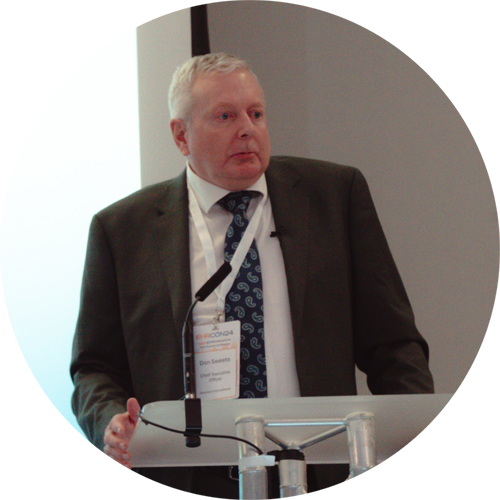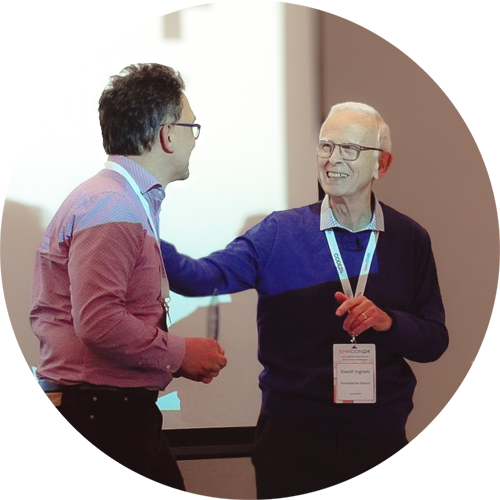On 5 and 6 November EHRCON24, the openEHR International conference, took place in Reading (UK). It was a veritable whirlwind of inspiring sessions, demos, panels, stands, fun breaks and dinners and even a real openEHR band (the Archetypes)! How do you sum up two days filled with activities? We take a stab at some highlights....

Highlight 1: Collaboration
It was already evident from the programme, which also featured representatives from other healthcare IT standards: the openEHR community is currently focused on collaboration. The need for collaboration with other standards, such as HL7 (FHIR) and SNOMED, was highlighted in the sessions by Ewout Kramer from Firefly and Don Sweete from SNOMED. Luke Readman from NHS London also mentioned that we need to figure out how the whole ‘ecosystem of standards’ can work together.

"We need to set our egos aside and collaborate to help the patient."
Don Sweete, CEO SNOMED International
Collaboration between software vendors is also important. This is something we ourselves also demonstrated in practice, together with vitagroup and Medblocks. Sebastian Iancu, Sidharth Ramesh and Stefan Schraps presented a joint demo showing vendor neutrality in action, based on our individual solutions combined with SMART on openEHR (which in turn is an extension of SMART on FHIR, see also this article). They told the story of Bettie, a 70-year-old Dutch asthma patient who travels to Germany and needs to make her medical data available across different systems as well as national borders. The open nature of our data platforms (CareBase24 and HIP CDR) allowed Bettie to retrieve her data in no time from both platforms, in a patient app developed by Medblocks.

There was also room at the conference to talk about international collaboration. Of course, the very foundation of openEHR is its international community, but there are several initiatives to use openEHR as a basis for closer international cooperation. For example, Severin Kohler of HiGHmed and Charité shared how European healthcare institutions are collaborating within the European openEHR Network, for both primary and secondary use of healthcare data.
Highlight 2: Artificial Intelligence
There's no getting around it: AI is, still, a hot topic. It could also be revolutionary in the world of openEHR. In the panel discussion around the future of data standards, for example, AI was mentioned as having the potential to automate data classification and extraction. Yet several speakers also mentioned again the need to ‘feed’ AI with high-quality, structured data (to avoid e.g. crap in, crap out and model collapse).

"Isn't AI a bridge too far? We are still working to get the data out of the silos. Patient histories are still not available."
Stefan Schraps, VP Business and Community Management vitagroup
Sidharth Ramesh also presented a fun interactive session around AI, first giving a live demonstration of several interesting features, but then also indicating that he did not yet fully trust AI - ‘guardrails’ are needed to ensure we can deploy AI safely and reliably.
All in all, there are numerous possibilities, but successful deployment of AI in the medical world hinges on the quality of the data - and even then, we must be aware at all times that, as David Ingram said, "computer algorithms can be echo chambers". The human element remains of the utmost importance.
There was also a perspective on the use of AI by the patients themselves: e-patient Dave deBronkart, in his passionate talk about empowering patients to play a greater role in their treatment, also shared the opportunities AI can offer. For example, AI can help ‘translate’ medical language so that patients can better understand their own medical data.
Highlight 3: a hopeful outlook
What several speakers also had in common was a certain optimism about the future. openEHR has now really carved out a place in the global discussion around healthcare data and healthcare IT and, as Sam Heard, president of the openEHR Foundation, said in his speech, "We have a real chance to make it."
A conference like EHRCON24 contributes to this in several ways: the community is expanded and strengthened, knowledge is shared and, as Ewout Kramer also mentioned, "the real work happens in the corridors." At the various dinners, coffee breaks and cosy get-togethers, experiences were shared and seeds were planted for further collaboration. Enormously valuable - this is how we move forward.
Highlight 4: the David Ingram Award!
Of course, the very first ‘David Ingram Award for Outstanding Contribution to openEHR’ was also a big highlight for our little CODE24 delegation, that we cannot ignore here... Our architect and co-founder Sebastian Iancu was the first to receive this award from Rachel Dunscombe, CEO of openEHR International, and David Ingram himself.

"Sebastian has shown an amazing commitment and support for openEHR, dedicating time to the SEC and making openEHR Netherlands. His support in enhancing community, infrastructure and assisting the wider community has been hugely appreciated by the openEHR board."
David Ingram, Emeritus Professor of Health Informatics at UCL, Chair at openEHR, Director of the openEHR Foundation and Trustee at the OpenEyes Charity
As his colleagues, we see every day how hard Sebastian works on CODE24 projects, the openEHR SEC and openEHR Netherlands - we are super proud that he was awarded this fine token of appreciation in front of the community that is so important to him.
Let's get to work!
Of course, just being optimistic won't get you far (although it certainly helps!). Several sessions also showed that we still have plenty of work to do. Governance is needed at various levels, the collaboration between the various standards needs to become more concrete, a lot of organisations still work in silos ...
And there are still many questions to which there are no clear answers yet. Should we ensure that we can actually get to the data as quickly as possible or should we make the conditions optimal for eventual reuse by further structuring the data? Do we want as ‘complete’ datasets as possible or do we go for 'lean and mean' based on specific use cases (and what are the risks in these choices)?
These are important things we need to discuss in order to arrive at an infostructure that will best serve care, and ultimately the patient.
Let's get to work and meet again at EHRCON25!